
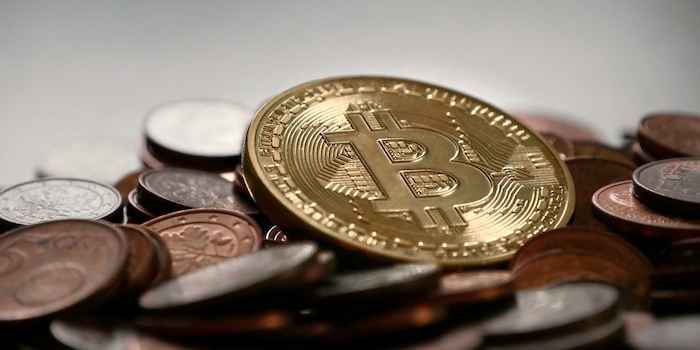
Cryptocurrencies: Is it still worth jumping on the bandwagon?
An old investment adage says that when even your grandmother wants to invest in something, the train has long since left the station. Is this also the case with cryptocurrencies?
When it comes to cryptocurrencies and blockchain, humanity is still in its infancy - comparable to the internet in the 90s. But it shouldn't and won't stay that way. So it's time to provide an overview of the topic and clear up any question marks about the fundamental aspects.
In the following lines, you will find out what cryptocurrencies are, how they are created, how they can be acquired and how they can be stored. I also look at the question of investment security and reveal other interesting details about cryptocurrencies that I have learnt in the past.
What are cryptocurrencies
December 2017; "Victory march, Bitcoin rises to 20,000 US dollars" - this or something similar was heard everywhere and read in every newspaper, every trade journal. People who had previously smiled at the digital currency were suddenly asking: How can I get in? Is it even worth it? What exactly are these bitcoins?
The name Bitcoin is made up of the words "bit" - a digital unit of measurement - and "coin", which means coin. The "digital coin" is based on blockchain technology, which makes cheating practically impossible and offers potential in many respects. Blockchains are decentralised internet databases that can manage transaction data. The transactions function without a central control authority (which deducts additional money). The blockchain can be used for more than just digital currencies. In future, blockchain could be used wherever a contract is created between two parties.
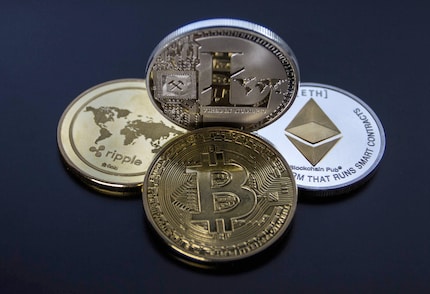
In addition to Bitcoin, there are thousands of other digital currencies and applications that are based on a wide variety of ideas, technologies and visions. New ICOs (Initial Coin Offerings) are launched every day, which are hungry for crowdfunding money and promise high profits in the event of an investment. It must be clearly stated here that there is a lot of nonsense and that you should not let your own greed run wild. Otherwise only one person will win in the end. And that is usually not the investor. You have to know your way around very well to find the real "pearls" among the new currencies and applications. Who knows - maybe we should also launch an ICO for a Digitec Coin! 😉
However, there are also already "established" coins, known as "altcoins" in technical jargon, which do not necessarily run on blockchain technology. These coins differ not only in terms of the technology used, but also in terms of their creation (called mining) and maximum creation potential. In the case of bitcoins, the maximum creation potential is said to correspond to 21 million currency units. According to current estimates, these 21 million will be reached in 2130.
How cryptocurrencies are created
New bitcoins are created through so-called "mining". This involves computers solving cryptographic computing tasks, which requires powerful hardware (graphics cards). Anyone can use their computer for mining, but nowadays it is mainly done commercially. Incidentally, the graphics card market is currently very exhausted due to mining. The high demand, combined with the low supply, has driven the price extremely high in recent months. Anyone who has owned Nvida shares for some time will currently have reason to cheer. However, there are also coins for which the "creators" have already generated the maximum number and are now distributing them in stages.
Mining, especially of Bitcoin, requires more and more energy, which has caused Bitcoin to suffer greatly in value due to corresponding regulations. The Asian region in particular is intervening heavily here. A major problem is that today's computing power will no longer generate the same mining yield tomorrow. Every four years, the yield of bitcoins mined per minute halves. At the moment, 12.5 Bitcoins are generated within 10 minutes (1728 per day) - in four years' time, it will only be 6.25 Bitcoins in 10 minutes. Due to the increasing number of miners - or the additional computing power that is constantly being added to the blockchain - it is also clear that mining bitcoins is only worthwhile in countries where electricity prices are low. More miners do not mean that more bitcoins are created, but that the algorithm adapts accordingly in order to achieve the same number of bitcoins in the 10 minutes through increased computing power.
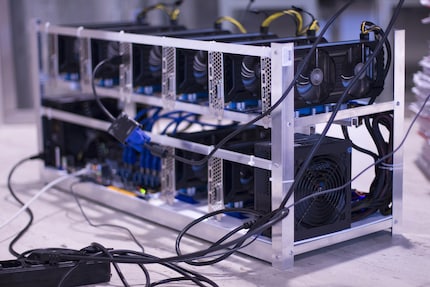
Mining other cryptocurrencies, such as Ethereum, may still be worthwhile. However, you shouldn't just assume the price of electricity, but also factor in any acquisition costs and equipment wear and tear.
Another option is cloud mining. This involves joining a network, mining the coins together for a predetermined period and receiving a share of the resulting "revenue". Here too, however, good research is required to ensure that you don't suddenly end up doing the work for a black sheep. If the price plays along over the corresponding term, cloud mining can definitely be worthwhile.
Where do I buy cryptocurrencies?
If you don't produce coins yourself and would like to own some, you can buy them from an online broker or an online exchange. For the time being, you should orientate yourself a little and rely on established market participants. Not all exchanges offer all coins. In addition to buying, some also offer the option of lending your coins for interest.
You should be clear about the strategy you are ultimately pursuing with the purchase of cryptocurrencies. Anyone who registers with a corresponding exchange automatically receives a digital wallet free of charge, which works in a similar way to a bank account.
On the exchanges and brokers, you can find all kinds of offers from other users who want to get rid of their coins (as a rule, you always buy a fraction of a coin). You have the option of paying by credit card. The entire payment process is secured accordingly so that you always receive the desired coins when you make a purchase. However, when buying in foreign currency, you should bear in mind that credit card providers often charge excessive exchange rates. The larger the purchase, the more attention you should pay to this aspect.
By the way: Additional costs (marketplace fees) are incurred when you buy or sell coins. These are usually split between the buyer and seller.
How do I store cryptocurrencies and how can I send them?
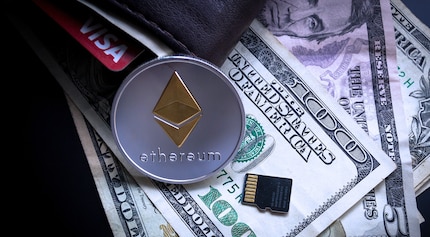
There are various options for storing cryptocurrencies. On the one hand, there is the option of storing your coins at a trusted exchange. Are they safe there? Yes and no; examples such as the hack of Bitfinex show that even big players are not always immune to attacks. Nevertheless, users are usually protected, as exchanges refund the lost coins to users in such cases. Incidentally, purchased currencies such as Bitcoin are not actually stored on or in the wallet of your exchange. They are always stored in the blockchain. It is noted in the decentralised database that your wallet address is entitled to a corresponding amount of coins. Your money is not physically stored at a traditional bank either (as far as I know, there is around seven per cent of real money available, as all customers never withdraw their entire savings). Here too, you only have a claim, a promise to the value that is recorded in your account.
Wallet addresses consist of a wildly mixed combination of numbers and upper and lower case letters (e.g. "12GtYyr29bTlEk2gS5nEYhpV7owAntNP8j "). This makes it virtually impossible for an address to appear twice in the blockchain. The possibility of this happening is smaller than if you hit the lottery half a dozen times, one right after the other, of course.
The other method of storing coins is the offline wallet in the form of a USB stick. If you store your coins offline and keep your wallet in a safe or bank safe deposit box, for example, your coins will be safe from hackers. Unless the hacker turns into a burglar or robber.


Ledger Nano S
Litecoin, Zcash, Dash, Bitcoin, Vertcoin, Neo, Ether, Ubiq, Ethereum Classic, Ripple, Bitcoin cash, Stellar, Komodo
If you have purchased your coins from an exchange and want to transfer them to another wallet (offline or online), you will need the recipient's wallet address. To avoid the tedious typing of wallet addresses and any errors, they can also be scanned in the form of a QR code.
The following three points should be observed when transferring coins:
- The transfer costs. During the Bitcoin boom, it quickly cost a double-digit amount. Unnecessary transactions should therefore be avoided. The coins are therefore not really suitable for microtransactions at the moment.
- The transaction can take time. We are not talking about days, but still a few hours. Depending on the utilisation of the network, this may be faster or slower.
- If you do not copy or mistype even one character of the wallet address, you risk losing the amount to be transferred. Unlike a traditional bank transfer, the money cannot be reclaimed. The coins are not "automatically" returned if the destination address is not in use - the money is gone.
How safe are cryptocurrencies as an investment
First of all, it should be said that cryptocurrencies are NOT an investment. Traditional investments may be gold, silver or property, which offer a stable equivalent value. Trading cryptocurrencies is ultimately a game. A total loss is virtually impossible, especially with established altcoins. However, the price of digital currencies can fluctuate in the ten-digit range within a few hours.
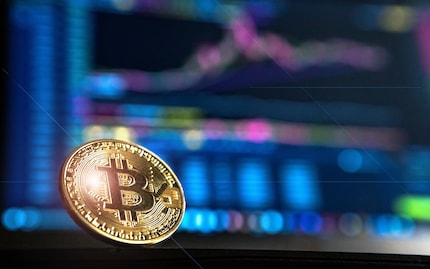
Cryptocurrencies are based on trust. Trust that the currencies will one day perhaps replace traditional bank money or at least be widely accepted as a means of payment alongside traditional money. Coins such as "IOTA" already show that large companies are open to the concept of cryptocurrencies. Large companies such as "Bosch" or "Volkswagen" already accept certain payments in "IOTA".
Other cryptocurrencies currently still function more as an investment, such as Bitcoin. It is already possible to pay with it in certain online shops and many shops abroad also accept Bitcoin as a means of payment - usually even in regions that are considered to be rather weak economically. However, many in our "latitudes" still only use it as a "safe investment" (by crypto market standards), more or less as digital gold.
Compared with other market caps, there is still far less in the pot in the crypto market as a whole than with Microsoft, Facebook or Apple, for example. Even compared to the ".com bubble" in the early 2000s, we are still at the very beginning. There is a possibility that the entire market will collapse massively, but this is quite realistic even with state money. This is shown by the example of India at the end of 2016, where the government cancelled many banknotes overnight. The supply of physical notes was then so limited that the people suffered massively as a result. Such examples show that since the abolition of the gold standard (1971), our fiat money has also been dependent solely on faith and trust.
What happens to cryptocurrencies in the event of a crisis?
There are two options:
- Everyone flees cryptocurrencies in favour of physical products such as gold
- Many people invest in the crypto market
Cases on a smaller scale have already shown that point 2 has tended to materialise so far. Confidence seems to be there at the moment. The "case" of Venezuela shows this very clearly with the state cryptocurrency "Petro".
Investment giants such as George Soros, the Rothschild family and Rockefeller are now also investing in Bitcoin and Co. When big players show confidence, this also strengthens the general trust in cryptocurrencies.
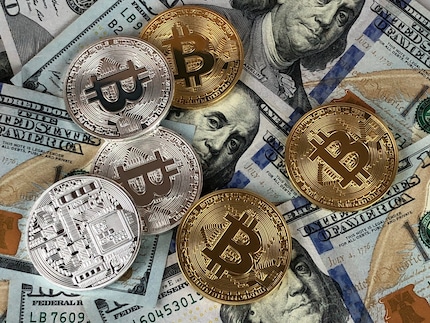
Although the value of Bitcoin has fallen by 50 per cent since the beginning of 2018, many believe in the future of digital currencies and that they will eventually replace legal tender. The recurring crashes due to countless creations out of nothing show that there is a fundamental flaw in our system. The crypto market is trying to take a different approach here by largely escaping the control of the state and the banks. Although certain regulations can be put in place, as was the case in Asia (mining bans), this does not dampen the confidence that internet giants are predicting for the crypto market.
The principles of successful investment gaming
Finally, some important points that will help you minimise the risk of loss:
- Invest only in what you understand. Read up on cryptocurrencies. How do they work, what is the philosophy? What potential for creation lies in this digital currency?
- Invest with money that you can lose completely. If a total loss won't let you sleep, then you're doing something wrong. Write off the money at the time of investment and be happy if your investment ultimately pays off. Never buy with other people's money or loans.
- Cryptocurrencies are speculative products. In my opinion, they belong in a good portfolio these days. Nevertheless, you should set the maximum amount to be invested at no more than four to eight per cent of your total assets.
- Define a time at which you want to exit. If you don't know yourself when you want to exit, you'll end up losing out. Listen to your mind, don't let emotions like greed guide you
- Buy when it's cheap. Sell when it's expensive. Admittedly, this sounds easier than it is. Especially in the crypto market, which has massive fluctuations within days. The price reacts to current regulations and events. If you pay attention to these, you won't miss out on the chance to make a profit.
- Use the "cost-average effect" by buying something every three months, for example. This reduces the risk of only buying when prices are high.
- Stretch your assets, don't invest everything in one coin. Bitcoin may be the "mother" of cryptocurrencies. This is always shown nicely by the fact that when Bitcoin rises, all others rise and when it falls, all others usually take a nosedive. Nevertheless, other coins may also win the race in the end. Therefore, spread your balance over eight to ten different coins, for example.
- Always keep some "cash" to one side so that you can strike quickly when good deals come up.
- Don't check the value of your investment every day. Otherwise you run the risk of your emotions getting the better of you.
- Invest the profit at the end to build sustainable wealth. Let the interest work for you, because unlike bank accounts, you can still benefit from it in the digital world.
Is it still worth jumping on the bandwagon now?
It's almost obvious that digital currencies have a future. So yes, it's worth jumping on the bandwagon. But it's not clear which carriage of the train you should get on. In other words, which coin or coins will ultimately win the race.
Personally, I think that one or more blockchain-based currencies will prevail. I am also convinced that the banks of our world will soon be a thing of the past.
What do you think? Do you agree with me or do you have arguments in favour of a different view? What kind of coins do you trade?
I look forward to your feedback in the discussion section.
Whether online or offline, I'm always doing something. Something in the sense of sports or long walks, wandering around aimlessly but with the mind, making various online projects from niche pages to affiliate networks to SEO - learning by doing is my passion.
Since 2017 I am also involved in developing know-how and investments in the field of stocks, ETFs, P2P credits and everything following modern technology (cryptocurrencies).
Interesting facts about products, behind-the-scenes looks at manufacturers and deep-dives on interesting people.
Show all